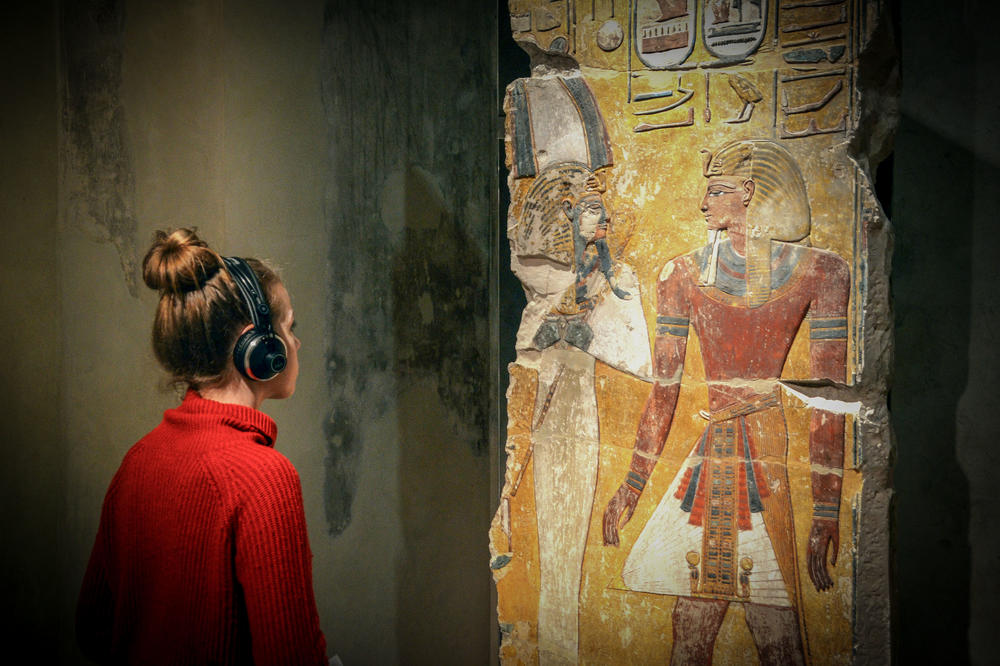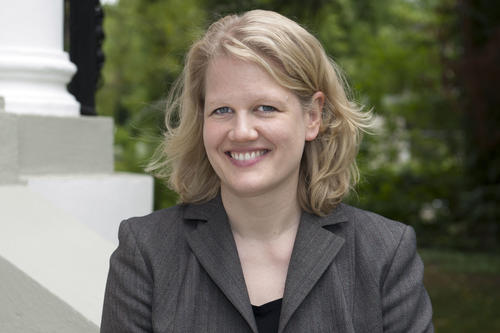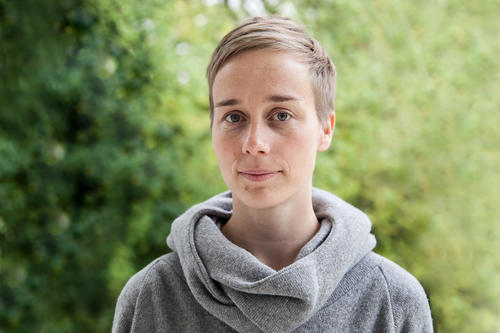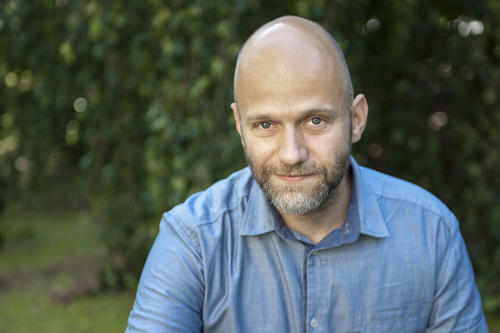Listening to the Past
An academic podcast tells the “The Story of Objects”
Feb 21, 2019
Academic knowledge packaged for listening: The “Story of Objects” podcast by Collaborative Research Center “Episteme in Motion” presents 5,000 years of the history of knowledge in a portable format.
Image Credit: Kristiane Hasselmann
This is where we should be able to find it: in a display case behind a heavy rosewood door in the Egyptian Museum, part of the Neues Museum in Berlin. But the object – a mysterious fragment of a pyramid – disappeared from the Berlin collection without a trace in 1889. Records of the artefact state that it was a sandstone fragment bearing 26 hieroglyphs: the original pyramid from which it came still apparently unidentified. Egyptologist Stephan Hartlepp of Freie Universität Berlin has gone out in search of its provenance, but what is special here is that interested parties can accompany him.
“The Story of Objects. 5,000 Years in the History of Knowledge, Packaged for Carrying and Listening Convenience” is the name of the 45-minute podcast series that Kristiane Hasselmann and her team have been creating since 2018. The second episode is about the lost pyramid fragment and can be found on all popular podcast providers as of February 28. It was produced when progress in research was being made. “We might have been unlucky,” says Hasselmann “and the search may have turned nothing up.” This is of course something that goes with the job in research work, and the podcast series intends to reflect exactly this sort of eventuality.
Hasselmann has a doctorate in theatre studies and is the director of the Collaborative Research Center (CRC) on “Episteme in Motion.” She also heads the subproject “Showrooms of Knowledge Transfer,” which aims to convey research perspectives and results to the broader public. The team includes CRC members Katrin Wächter, Armin Hempel, and the script writer Jan Fusek.
Kristiane Hasselmann is the managing director of “Episteme in Motion.”
Image Credit: Erika Borbély Hansen
“We need to approach topics in a way that is different from the academic norm,” says Hasselmann.
In the first, highly amusing episode, the podcast team set out to uncover the secret of a ruby red teapot, which took them to Peacock Island in the River Havel. The recording won over members of subprojects within the CRC, whose initial skepticism about the podcast format soon dissipated. “Since the first episode there has been increased interest among the other members of the center in making their own series of podcasts,” says Hasselmann.
The challenge is to tell the history of the objects in sufficient detail for academics to identify with it; yet the presentation should be sharp and entertaining enough to hold people’s attention. “We need to approach topics in a way that differs from the academic norm,” says Kristiane Hasselmann.
The podcast team takes its cue from the many varied subprojects that form the CRC.
The interesting thing about “The Story of Objects” is the way the various departments and institutions involved in the CRC pool their expertise across disciplines. Museums play their part along with university institutions. Olivia Zorn, acting director of the Egyptian Museum, did not take much persuading to agree to appear in the current episode. “It’s important to be open,” she says, “because this medium allows us to attract new audiences and show the public that there is nothing dusty or boring about museums.”
The podcast team takes its cue from the diverse subprojects that form the CRC. The subject of the missing pyramid fragment was suggested by the Egyptology department – and won the team over at once. “We try to reveal the history of objects by pestering our colleagues with questions,” says Hasselmann. “We’re not ancient historians – fortunately, as it turns out in this case.” The direction of script in hieroglyphics can change – something that experts are aware of, but that had to be explained in the podcast to the lay public. “We are careful to spend time delving into the topics, to understand the project method and develop a voice suited to the object and the discipline in question.”
The podcast format lends itself to the unfolding of a story.
Wächter explains that the podcast team chose to make audio recordings because stories can be seen to evolve. Original texts can be cited, sound effects used, and connections explained. She adds that diverse methods of working and various periods of investigation can be depicted, and scientific methods can be conveyed through the medium of narration. While the ruby-red teapot episode was told in a flamboyant Baroque narrative style with the extensive use of “chapter headings” and a harpsichord soundtrack, the search for the fragment of pyramid took on the character of an archaeological field study.
The podcast is itself a research project. For example, the researchers prepared a phonetic transposition of the hieroglyphs on the fragment, with the aim of reawakening this long extinct language. “The acoustic presentation of Ancient Egyptian was very tricky,” recalls Wächter. They cast around for an Arabic speaker who would be able to read the inscription in its international phonetic form. This worked – and the resulting reading gives one goose bumps. The reconstruction, say the podcast makers, was so successful that it is already being used in Egyptology seminars. The complete recorded text can be downloaded as an extra.
There is a sophisticated strategy behind the use of sound effects.
Each of the audio pieces is sophisticated and professional, so much so that when the Deutschlandfunk Kultur radio station learned about it, they were keen to become a media partner. The project benefited from the experience of screenwriter Jan Fusek, who helped provide scripts and dramatize the episodes. The music is by Armin Hempel, who also takes responsibility for technical execution. The use of sound effects was carefully thought out, and Hasselmann explains, “We are working with sounds that make the story more vivid – but are not intended as purely illustrative.” It is not a matter of producing as authentic an illusion of historical events as possible. Rather, there is a certain irony in approaching the subject from this new angle; the voiceover in Ancient Egyptian naturally indicates the existence of a studio situation, thus giving away what is really going on: it is a story, and despite all the academic meticulousness brought to the process, it is speculative.
The première of the current episode will take place on February 28 at Neues Museum on Berlin’s Museum Island. It was quickly booked up, and other dates are being planned. A special display case – intriguingly empty – will be staged for these evenings, with lighting and its original label. The fragment itself? “We assume,” says Hasselmann, “that it is lying in some box in a storage room or in a private collection somewhere.” Egyptologist Stephan Hartlepp and listeners to the podcast may not know the whereabouts of the fragment, but they are certainly keen detectives when it comes to establishing its provenance.
The Episteme in Motion Collaborative Research Center
“Episteme in Motion. Transfer of Knowledge from the Ancient World to the Early Modern period” is a CRC at Freie Universität Berlin. Funded by the German Research Foundation (DFG), the research association investigates processes of knowledge transfer in European and non-European cultures in the pre-modern period. Alongside Freie Universität Berlin, its partners include Humboldt-Universität zu Berlin, the Max Planck Institute for the History of Science, and the Karlsruhe Institute of Technology, encompassing 34 disciplines from the humanities, history, art, and cultural studies subject areas.




